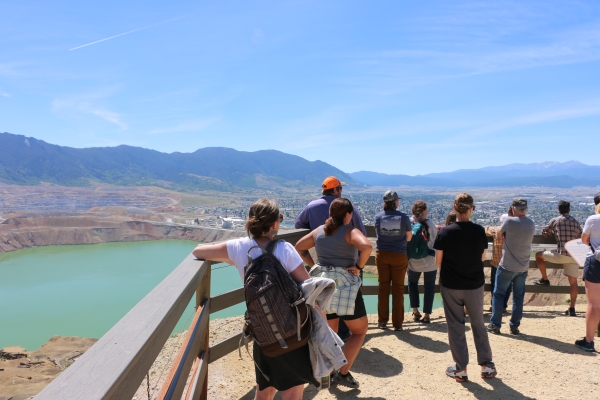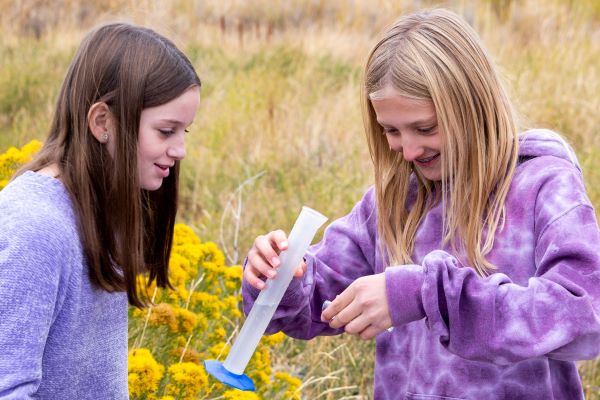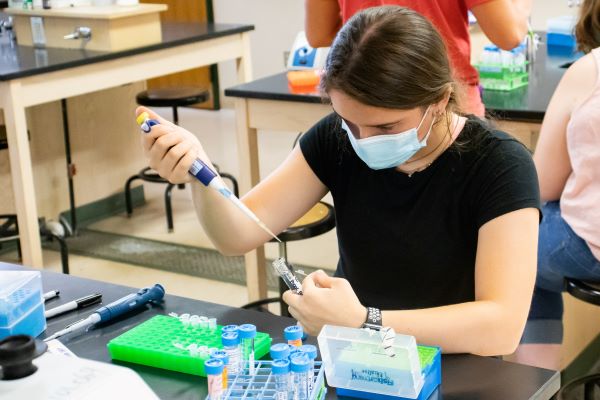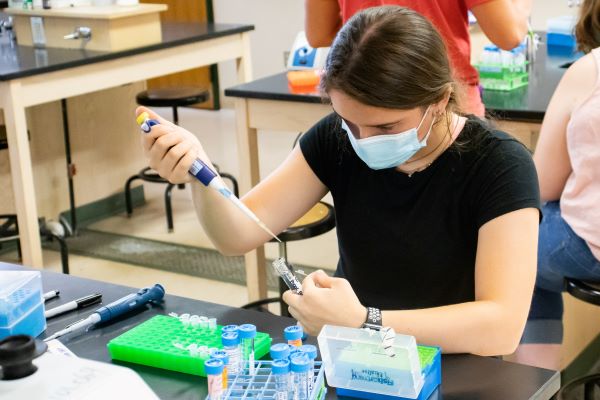SUPERFUND: A LABORATORY FOR STEM EDUCATION

By: Rayelynn Brandl
The Clark Fork Watershed Education Program (CFWEP) is celebrating 20 years of programming excellence this year. In 2003, a geologist at Montana Tech, a hydrogeologist working for the Montana Department of Environmental Quality, and a biology teacher at Butte High School dreamed of a day when all of the students within the Clark Fork basin would understand the unique history of their place, engage with authentic science practices, and become stewards of the newly restored river system, all while using the landscapes of the Clark Fork River Watershed as their outdoor laboratories. To achieve this vision, Dr. Colleen Elliott (Montana Bureau of Mines and Geology), Joe Griffin (Department of Environmental Quality, retired), and Bill Callaghan (member of Butte Natural Resource Council and retired high school teacher) engaged Amy Verlanic (Executive Director of Montana Tech's Institute for Educational Opportunities) to help secure funding from the Natural Resource Damage Program, and CFWEP was born.
The program started with Bill's classroom and a pilot project in Butte in 2003 and quickly spread to other communities as teachers and students started to open their eyes to both the historic damage within the watershed and the unlimited possibilities for the future restoration of long-dead streams. By 2005, the program was serving schools from Butte to Missoula and included the schools within the Blackfoot Watershed. Today, the program has expanded beyond the Clark Fork Watershed schools, serving teachers and students throughout the state of Montana. As of December 2022, the program has served 76,069 students and 901 teachers within 43 Montana communities, providing nearly 300,000 contact hours. CFWEP has been locally and nationally recognized, garnering 22 awards for excellence since its founding.
CFWEP's watershed science programming includes five days of learning for middle school students, during which students learn about the historic damage to the watershed and the science behind restoration. Following four days of in-class instruction, students are treated to a field trip at the river with practicing scientists who help students assess the health of their nearby stream. Students return to Montana Tech to analyze their data and answer the question, "is our stream healthy?" While on campus, students get a snippet of college life and can imagine themselves as a Tech student.

CFWEP's founders aligned the program with the strategy that the science and history could speak for themselves, that CFWEP would remain non-advocational in its work. A core lesson of the program is to reveal that it is not only possible, but also necessary, to have both a healthy mining economy and a healthy environment. CFWEP's programming and lessons inspire students to become innovators who are not afraid to tackle seemingly impossible tasks like restoring an entire river ecosystem. They remind students to think big when it comes to developing innovative strategies for reducing mining's footprint and to take simple actions every day to protect their restored and healthy landscapes.
CFWEP's current director, Rayelynn Brandl, was recently featured on CBS This Morning and as part of Nora Sak's National Public Radio podcast, The Richest Hill. Both producers invited Rayelynn to share her experiences growing up in Butte post Superfund declaration. Rayelynn reflected that important history is being written right now, that the stories of rebirth, innovation, and sheer grit are equally as powerful as the stories of early mining and the heyday of Butte. This reflection is a cornerstone of the core ideology of CFWEP. The program's goal is to inspire the next generation of scientifically literate citizens who will care for the restored landscapes of the Clark Fork.

Since the beginning, the CFWEP founders realized that in order to truly achieve the vision of creating scientifically literate citizens who would care for their landscapes, teachers were critical to the mission. CFWEP has provided teacher professional development by effectively partnering with the University of Montana, University of Montana-Western, Montana State University-Bozeman, Montana State University-Billings, and Salish-Kootenai College. Currently, CFWEP partners with Montana Tech Biology professor Dr. Marisa Pedulla to deliver a second National Institutes of Health (NIH) grant called PHAGES, which equips teachers to deliver a phage-discovery program within their school districts.
Phages are viruses that infect bacteria and are currently being studied and utilized to fight antibiotic-resistant strains of various bacteria, including tuberculosis and staph. Through the PHAGES project, CFWEP is helping to build remote labs in target schools, ensuring that teachers have access to the necessary equipment needed to carry out the experiments with their students, ensuring scientific literacy for Montana students. High school students are able to apply for paid summer internships through the project, which enables students to engage in real-world research projects prior to entering college and during the first years of their college experience. This pipeline program has been an effective recruiting tool for Montana Tech, bringing several full-time students to campus, some of whom have gone on to graduate work as well.

The CFWEP program is undergoing a transformation, driven in part by funding, but also by the needs of the citizens of Montana. The legacy of restoration and learning within the outdoor laboratory known as the Clark Fork Watershed has provided an excellent model for stewardship, innovative STEM outreach, and student engagement. As the restoration dollars from the Natural Resource Damage program are being spent down, CFWEP's continued funding from this source is also dwindling. In order to continue meeting the needs of students, teachers, and community members, CFWEP launched a diversification strategy in 2020, aiming to achieve 25% of funding from NRD contracts, 25% from private donors and foundations, 25% from fee for service programming, and 25% from national grants. The program partners, leadership teams, and staff are engaged in fundraising from all sources and are diligently looking into partnership opportunities throughout the State.
CFWEP's current staff team includes: Rayelynn Brandl, Tammy Gordon ('09), Dalit Guscio, Rachel Neal, Chris Pavlovich, Teal Taylor ('19), and Melissa Wanamaker. CFWEP continues to be supported by our leadership team and founding members, Dr. Colleen Elliott, Joe Griffin, Justin Ringsak ('03), and Amy Verlanic ('03). The program has recruited a team of business leaders and thinkers who are dedicated to helping CFWEP achieve their funding goals. The Executive Leadership Team is composed of the following members: Dr. Steve Gammon, Montana Tech; Brad Archibald, Pioneer Technical Services; Maggie Davis-Welch, Butte Broadcasting, Inc.; Rick Edwards, NorthWestern Energy; Elizabeth Erickson, Water and Environmental Technologies; Jeremy Fleege, Montana Resources; Erick Greene, Montana Osprey Project; JR Hansen, Veteran, U.S. Navy, Southwest Airlines, High Alpha Aviation; Lindy Hanson, Atlantic Richfield Company; Sidni Markovich, Markovich Inc.; Matt Vincent, Rampart Solutions; and Joe Willauer, Submittable.
If you are interested in learning more about CFWEP's programming or would like to support this program's legacy, please visit cfwep.org/support or contact Melissa Wanamaker, director community engagement & development, at mwanamaker@mtech.edu. Your generous gift will ensure CFWEP's mission for generations to come.